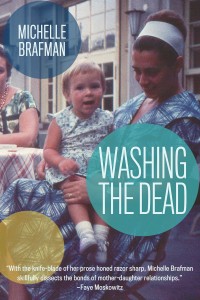344 pages, $19.99
Review by David S. Atkinson
Barbara confesses an odd thing to her sonographer when eighteen weeks pregnant with her daughter. She says she “prayed that God had spared a girl from landing in [her] womb.” That’s a pretty heavy way to start Washing the Dead, the debut novel by Michelle Brafman (a teacher at The Johns Hopkins MA in Writing program whose writing has appeared in Fifth Wednesday Journal, the minnesota review, Blackbird, Slate, the Washington Post, and elsewhere). Regardless, knowing what I know now, it seems like a pretty apt place to begin.
Barbara is terrified about raising a girl because of her traumatic relationship with her mother. Her mother was loving, but could occasionally be inexplicably distant:
My mother’s mood hovered over us, a mist that could either turn to rain or vanish into the sunlight. During our family walk to Shabbos services, I saw her eyes honeying over, the first sign that at any moment she could dip away from us, into that place inside herself. Even since last April, the mist had turned soupy, and I worried that we would both drown in it.
“Let’s do the last block fast, Mom.” If we moved quickly, we could outrun the fog.
Barbara relies on the support of her tight-knit ultra-Orthodox Jewish community to make up for what she missed during those distances. However, Barbara discovers her mother is having an affair with the gentile who performs Sabbath-forbidden tasks for the community:
I opened the door, and the strong lake breeze sent a shiver through me. I ran barefoot down the steps into the deserted alley, past the freshly painted garage, my feet slamming against the pavement, my toe throbbing.
“Mom!”
The word was swallowed up by the familiar grumble of the blue Dodge idling in the alley, five houses past ours. I watched my mother walk to the car and glide into the Shabbos goy’s arms as if she were his Olympic figure-skating partner. I watched the Shabbos goy open the passenger door and the wind blow my mother’s hair wild.
In the wake of this scandal, Barbara’s mother abandons her, the community turns their backs, and Barbara loses all she knows.
The present day of the novel is when Barbara’s daughter is sixteen. Barbara has struggled to live a good life and be good to her daughter, but things are falling apart. Her daughter is increasingly troubled, her mostly estranged mother is showing signs of Alzheimer’s, and Barbara herself is cracking. Out of the blue, Barbara is called on to participate in an important religious ceremony honoring the deceased teacher who was basically her second mother. This sets off a chain reaction of events, forcing Barbara to face the past and unearth the secrets she never imagined about her mother, her religious community, and the life she thought she knew. Barbara has to try to make peace with her mother, her daughter, and herself.
Reflecting on my reactions to Washing the Dead, I’m not sure which I enjoyed more: the emotional journey or the detective-like aspects of the story. The characters are engaging, and are certainly placed at critical moments in their lives. The balance of hide and reveal was also compelling for me, propelling me through the book to piece together what the heck was actually going on. However, I suppose I don’t really have to pick, since both were unified aspects of the same gripping story. Whatever was operating on me at a particular moment, I kept eagerly turning those pages.
I also have to admit succumbing to a certain fascination for the glimpse into the ultra-Orthodox world. The washing of the dead, the purification in mixed rain and tap water pools, the 613 commandments, and all those other things so foreign to my experience. They’re side things really, but they captivated me along the way just the same.
Washing the Dead is an impressively well written debut novel. The warmth and heartbreak are plentiful enough to move, and the mysteries amply keep readers needing to know more. I actually felt anxious when bad things happened and a sense of accomplishment whenever redemption was achieved. For me, these fictional events kept taking on the significance of real life, and I deeply enjoyed my immersion this novel.
***
David S. Atkinson is the author of Not Quite so Stories (forthcoming, Literary Wanderlust), The Garden of Good and Evil Pancakes (NIEA finalist), and Bones Buried in the Dirt (Next Generation Indie Book Awards finalist). His writing appears in Bartleby Snopes, Grey Sparrow Journal, Atticus Review, and others. Website: http://davidsatkinsonwriting.com/.
![[PANK]](https://pankmagazine.com/wp-content/themes/pank/assets/images/pank-logo-large.png)

